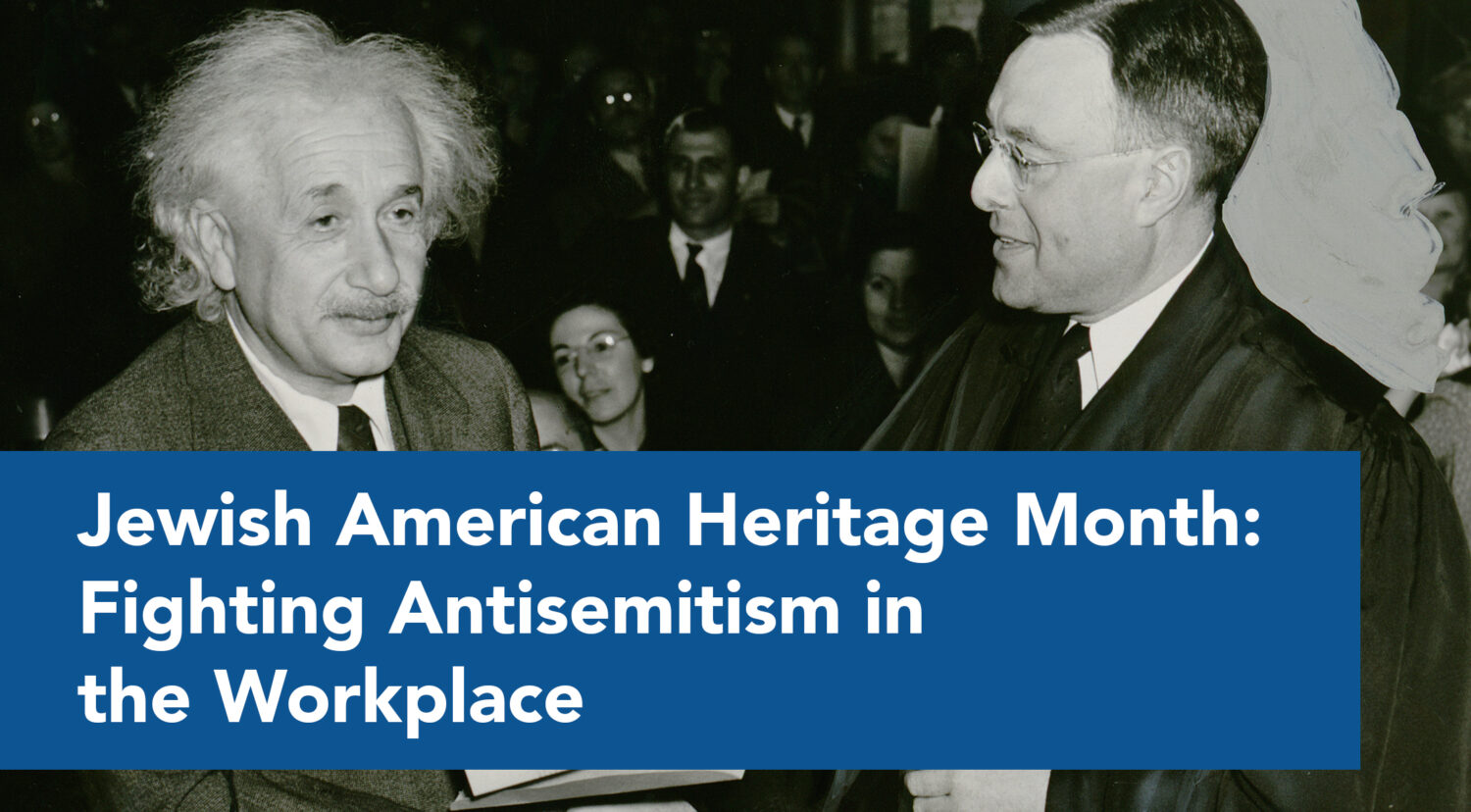

My Dear HR Professionals,
It’s Jewish American Heritage Month so we have a valuable opportunity to celebrate the rich cultural contributions of Jewish Americans and reaffirm our commitment to fostering a workplace culture that embraces diversity, inclusion, and respect for all, regardless of religion, country of origin, or identified ethnicity. In this blog post, we’ll explore the significance of Jewish American Heritage Month, discuss the importance of religious accommodation and anti-discrimination laws in the workplace, and provide strategies for combatting stereotypes and promoting diversity and inclusion through training initiatives.
Understanding Jewish American Heritage Month: Recognizing Cultural Contributions
As of 2020, there are roughly 7.5 million American Jews, according to the Pew Research Center. Jewish American Heritage Month, observed annually in May, provides an occasion to celebrate the diverse history, culture, and achievements of those Jewish Americans. They have been (and still are) pioneering scientists and scholars, influential artists, entrepreneurs, businesspeople, line workers—you name it. They have made indelible contributions to virtually every aspect of American society, enriching our nation’s cultural tapestry and driving innovation and progress.
If you need employees with degrees, Jewish culture puts a lot of emphasis on education. In fact, 37% of all American Nobel Prize winners have been Jewish despite being only 2.5% of the population. Think of all the Jewish American physicists, such as Einstein and Carl Sagan. There are businesspeople in all areas, including aerospace, so they’re probably government contractors and subcontractors, too! For a great collection of lists of prominent past and present Jewish Americans in different fields, Wikipedia has the page for you.
By the way, there are even non-white Jewish Americans. (Not that all people of Jewish descent that are considered white consider themselves white.) According to that same Pew survey from 2020, some 15% of young Jewish adults are not white. This 15% face not only religious discrimination, but racial as well.
Ensuring Religious Accommodation and Compliance with Anti-Discrimination Laws
As HR professionals, it’s essential to ensure that workplaces are inclusive and accommodating of employees’ religious beliefs and practices. Federal and state laws, such as Title VII of the Civil Rights Act of 1964, mandate that employers provide reasonable accommodations for employees’ religious observances, unless doing so would pose an undue hardship on the organization. By proactively addressing requests for religious accommodation and implementing inclusive policies and practices, employers can create an environment where all employees feel valued, respected, and supported.
And, again, we have to consider discrimination due to country of origin. While the vast majority of Jewish Americans have been born in the USA, there are obviously many who are from Israel. Due to current events—the war in Gaza—many Israeli American Jews are finding themselves in very tough situations for something they have nothing to do with. (This is also true of many Muslim Americans due to the same current events.)
Combatting Discrimination and Harassment in the Workplace
Despite legal protections against religious discrimination and harassment, instances of bias and prejudice still occur in the workplace. In 2019 and 2020, 51% of Jewish Americans experienced antisemitism. Things are most likely worse right now in 2024, and it’s almost certain some of that is in the workplace.
HR professionals play a critical role in preventing and addressing discrimination and harassment by fostering a culture of zero tolerance, providing avenues for reporting and addressing complaints, and conducting thorough investigations when incidents arise. By promoting awareness and accountability, organizations can create a safe and inclusive environment where employees can thrive.
Promoting Diversity and Inclusion through Training Initiatives
One of the most effective ways to combat stereotypes and promote diversity and inclusion in the workplace is through training initiatives. By providing employees with education and awareness about different cultures, religions, and perspectives, organizations can challenge biases, foster empathy and understanding, and cultivate a more inclusive and harmonious work environment. HR professionals can facilitate diversity and inclusion training sessions, workshops, and discussions to engage employees and promote a culture of respect and acceptance.
Conclusion: Embracing Diversity and Inclusion
As we continue to commemorate Jewish American Heritage Month, let us reaffirm our commitment to fostering a workplace culture that embraces diversity, inclusion, and respect for all. By prioritizing religious accommodation, compliance with anti-discrimination laws, and initiatives to combat stereotypes, HR professionals can help create an environment where every employee, including Jewish ones, feels valued, empowered, and able to bring their whole selves to work. Together, let us build workplaces that reflect the rich tapestry of our society and honor the contributions of all individuals.
- Pew Research Center, ed. “Jewish Americans in 2020.” Pew Research Center, 2021. May 11. https://www.pewresearch.org/religion/2021/05/11/jewish-americans-in-2020/.
- Wikipedia, ed. “List of American Jews.” Wikimedia Foundation, Inc, 2023. December 31. https://en.wikipedia.org/wiki/Lists_of_American_Jews #Academics.
And if you’re looking for a good summary of the Pew article, go click here. Sales, Ben. “The Pew Study Cheat Sheet: 10 Key Conclusions from the New Survey of American Jews.” Jewish Telegraphic Agency, 2021. May 11. https://www.jta.org/2021/05/11/united-states/the-pew-study-cheat-sheet-10-key-conclusions-from-the-new-survey-of-american-jews.
HR Unlimited, Inc. specializes in helping federal contractors and employers effectively meet their AAP and EEO compliance obligations. Please contact us to discuss any of your questions, concerns, or needs in this area.





